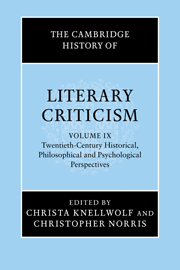Book contents
- Frontmatter
- Introduction
- HISTORY
- MARXISM AND POST-MARXISM
- FROM CULTURAL POETICS TO CULTURAL STUDIES
- PSYCHOANALYTIC APPROACHES
- GENDER AND SEXUALITY
- COLONIALISM, POST-COLONIALITY, NATION AND RACE
- 18 Post-colonial theory
- 19 African American literary history and criticism
- 20 Anthropological criticism
- MODERNITY AND POSTMODERNISM
- PHILOSOPHY, AESTHETICS AND LITERARY CRITICISM
- INTERDISCIPLINARY APPROACHES
- Bibliography
- Index
- References
20 - Anthropological criticism
from COLONIALISM, POST-COLONIALITY, NATION AND RACE
Published online by Cambridge University Press: 28 March 2008
- Frontmatter
- Introduction
- HISTORY
- MARXISM AND POST-MARXISM
- FROM CULTURAL POETICS TO CULTURAL STUDIES
- PSYCHOANALYTIC APPROACHES
- GENDER AND SEXUALITY
- COLONIALISM, POST-COLONIALITY, NATION AND RACE
- 18 Post-colonial theory
- 19 African American literary history and criticism
- 20 Anthropological criticism
- MODERNITY AND POSTMODERNISM
- PHILOSOPHY, AESTHETICS AND LITERARY CRITICISM
- INTERDISCIPLINARY APPROACHES
- Bibliography
- Index
- References
Summary
Anthropological criticism refers, broadly speaking, to a form of criticism that situates the making, dissemination and reception of literature within the conventions and cultural practices of human societies. Such an undertaking has become increasingly suspect in the twentieth century as critiques of the idea of the centred subject and of a stable field of knowledge have been voiced. One critic has referred to its ‘history of complicity variously with racism and slavery … its readiness to facilitate colonial governance’. Another has asserted: ‘Every focus excludes: there is no politically innocent methodology for inter-cultural interpretation.’ These questions have occupied prominent thinkers such as Jean-Paul Sartre, Claude Lévi-Strauss, Edward Said and Jacques Derrida. Anthropology is seen as upholding a privileged position whereby the dominant codes of western culture, including patriarchy and imperialism, survey, classify and govern the cultures of the east, the third world, of people of colour, women and those of different sexual preferences. As such, the discipline appears to perpetuate the same/other binary that is a part of the logocentric tradition of western culture. These matters will be discussed in the course of this essay. To begin with, I will present a brief summary of the relation of anthropology to literary criticism during this century.
Anthropological criticism came into sharp prominence during the early years of the twentieth century. The Cambridge school of classical anthropology took up the work of Sir James Frazer and applied the methods of his magnum opus, The Golden Bough, to the study of Greek drama. The conclusions of this loosely knit group of scholars and writers, sometimes known as the ‘ritualists’ (Jane Harrison, F. M. Cornford, A. B. Cook and Gilbert Murray), were that a pre-history of myth and ritual is present in Greek drama. Classical drama was thus read as a displaced narrative of much older, pagan ceremonial forms.
- Type
- Chapter
- Information
- The Cambridge History of Literary Criticism , pp. 265 - 274Publisher: Cambridge University PressPrint publication year: 2001
References
- 2
- Cited by

